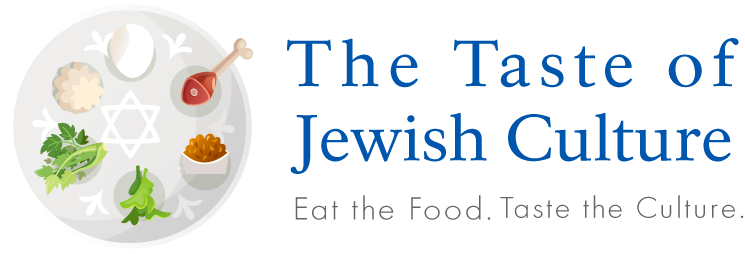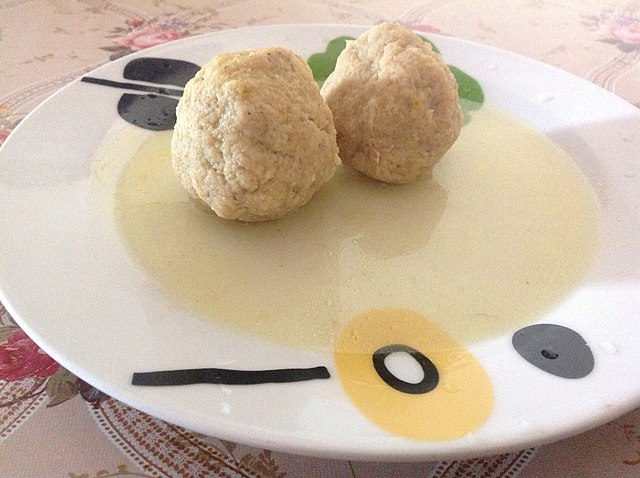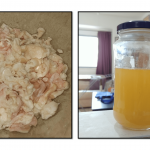One of the more interesting sub-cuisines in our diverse canon is Persian Jewish Food. The Persian community (from what is today known as Iran) is one of the oldest Diaspora communities, dating back at least over 2600 years. The community’s food is aromatic, colorful and full of vibrant flavors. Yet, it is among the lesser known cuisines to non-Persian Jews. One dish, in particular, stands apart, even within the corpus of the foods of Persian Jewry: Gondi. This special food is a true gastronomic delight, and enlightening about the culture of Persia’s Jews both due to what it is, and by what sets it apart from the other foods this community eats.
What exactly is Gondi? The classic example is a type of meatball, usually made of ground chicken or turkey (I prefer the more flavorful chicken version). The ground meat is mixed with grated or pureed onion, aromatic spices, and importantly, chickpea flour. This results in a flavorful and fluffy meatball that some have characterized as a meatball meats a matzoh ball. It is typically served in a (sometimes slightly sour) chicken soup or broth, and can vary in size between about 2 inches in diameter to around 6. If the larger size, it is usually served as one ball per bowl of soup, with 3 or 4 of the smaller ones showing up in a bowl.
Why Are Gondi Special?
In addition to just tasting really good, gondi are also special because they are one of the only foods that is unique to the Persian Jewish community. You will neither encounter gondi among non-Jewish Persians, nor among non-Persian Jews. The closest I have found in non-Jewish Persian cookbooks was from 1974. Titled “Koofteh-ye Ard-e Nakhochi,” which I believe means something like “meatballs with chickpeas,” the recipe was for a similar meatball but made using beef, and sauteed before simmering in broth or baking in an oven.(1)Persian Cooking: A Table of Exotic Delights, Nesta Ramazani Other recipes I have found for this dish, however, also incorporate rice into the meatball and serve them in sauce rather than soup.
The use of chicken in Jewish gondi suggests another reason this dish is special for Persian Jews. For most of history, chicken was actually more expensive, per pound, than other meats, since they could only be raised in small flocks. Before antibiotics, farmers would not raise large flocks of chicken since disease could spread rapidly and wipe out the whole flock. As an expensive, and thus more honored meat, chicken was reserved for Shabbat, the time that Jews most commonly eat gondi. On a culinary level, using the more mildly-flavored chicken meat allows for a more sublime taste, then when made with beef.
Gondi: Quintessential Persian Jewish Food
What makes gondi even more intriguing is when it is placed alongside the other foods of Persian Jews. Most of the foods that are loved by the community (for example gormeh sabzi, fesenjan, or kuku sabzi) are commonly eaten by other Persians as well. Gondi is an exception (as is at least one of the common Shabbat stews of some Persian Jews, khalebibi). But the power of exceptions is that they help to place the “rule” into even sharper contrast.
Why is it that most of the foods of Persian Jews are basically the same as those of general Persians? Because of that very long history I already mentioned. The Jews of Persia first arrived there before the destruction of the First Temple in 586 BCE. The cuisine of Persia today barely resembles the foods that were eaten there at that time, meaning that Jews have lived as a part of the Persian community throughout the entire period of the development of the region’s gastronomy. So of course they would eat the same general dishes! In other words, gondi’s distinction helps us to recognize how intertwined the history of Persia’s Jews is with that of the overall population there.
Many recipes are available online, and I encourage you to mix and match between them based on your own personal taste. I have made gondi a few times, and they are truly delicious and not particularly complicated to prepare. I was honored when I served them at a meal with many Persian Jews in attendance and was told they tasted delicious and genuine. Even if they may have only been complimenting me to be polite, I’ll take it at face value!
Footnotes
| ↑1 | Persian Cooking: A Table of Exotic Delights, Nesta Ramazani |
|---|







Warren Burstein
“Keren Rothstein, aka DJ Gondi – referencing a staple of Persian cuisine …”
https://www.jpost.com/israel-news/culture/dj-gondi-to-appear-at-israel-music-showcase-festival-685704
Jaime
Very interesting. I like the history and cultural developments of various foods. Thank you
Ilana
I have made gondi, and they are so delicious, but unfortunately neither I, my spouse, nor several other people (anecdotally, on the internet) can tolerate/digest chickpea flour… Terrible Things happen gastrointestinally! I have to wonder, is it a matter of habituation? Clearly Iranians and Persian Jews manage just fine, but I’m afraid to make these again, even though they were so delicious. Has this come up in your research at all?
Sherry
It’s also thought to use chicken, to avoid mixing meat and dairy! Especially on Shabbat.